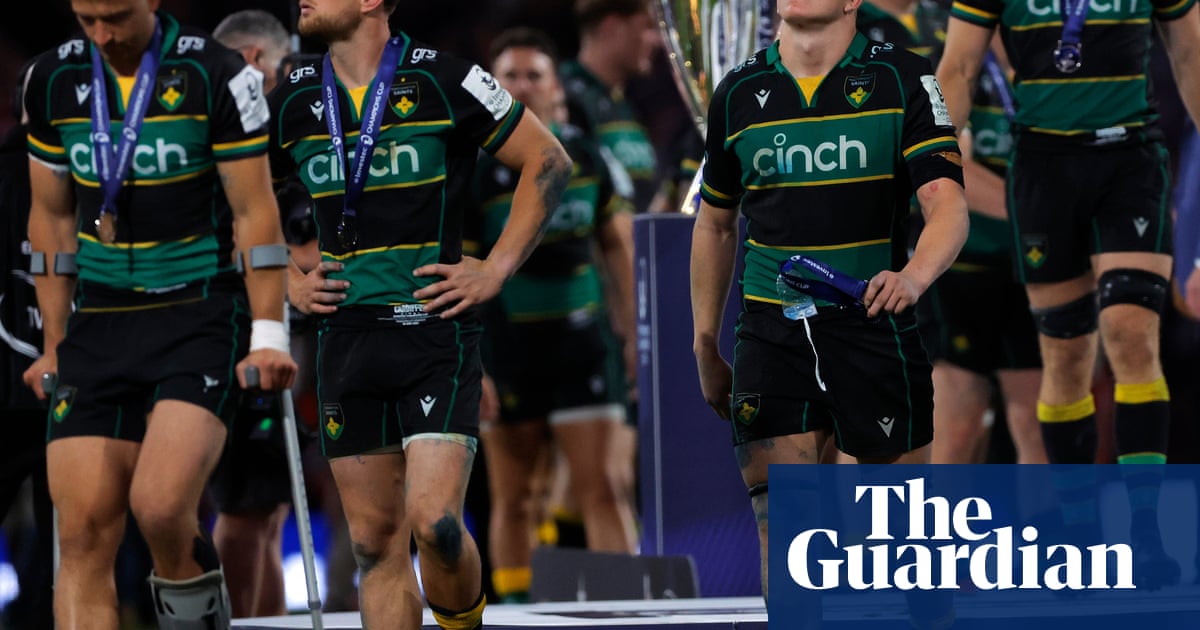A new name is on the cup. They reckon UnionBordeaux Bèglesare the best-supported rugby union club in the world. To be in Cardiff was not to be disabused of the notion. Rugby is massive in France, on a par with football, and bigger in the southern half of the country. It creates a different kind of animal.
Northampton were proud, brave, inventive –but in the end overpowered. The narrative was wild and, Saints might say, liable to have gone either way. A raucous stadium – for Northampton are one of the best supported in England – was treated to crazy fluctuations in fortune, tries scored and overturned, penalties, knock-ons and high tackles subject to review after review.
But when the dust settled, the reality of a top club in the sport’s biggest market imposed itself onNorthampton, champions of England maybe, but a side who have hit their straps this season only in this competition. What a job they have made of it.
It has almost been tacitly accepted in English rugby that glory days in Europe may have to wait for a while, so much more powerful and deep are the squads in French and Irish rugby these days. Saints and Harlequins worked wonders to make the semi-finals last year, but to go a step further again was a triumph against all odds for the former, given their injuries and the vagaries in form.
Alas, the echoes of their previous appearance in this final,here in 2011, were all too poignant. Back then they rattled up a 22-6 lead against Leinster by half-time, only to ship 27 unanswered points. No such indignity this time. Alex Coles scored tries at either end of the first half to level 20-20 at the break. But the spectre of a scoreless second half returned, despite Henry Pollock’s dash to the line from a lineout early, chalked off for a tug by Coles. Bordeaux ground out eight unanswered points for the win.
Pollock’s was but one of a number of incidents subjected to trial by TMO. He had another effort chalked off five minutes from the break, marginally offside when he touched down Fin Smith’s chip ahead. Bordeaux had two of their own disallowed, one for a forward pass between their deadly wingers, Louis Bielle-Biarrey and Damian Penaud, the latter adding another two tries to his tally and collecting the player of the tournament award.
By the end Northampton were still swinging but exhausted. They had picked a team to take the match to the opposition, but it was shot through with risk, a statement of boldness or, some might wonder, a devil-may-care roll of the dice. One surprise recovery from injury is one thing, but to unveil five of them in your squad might not be the sort of gamble a club with a bigger budget would take.
Alas, two of them, James Ramm and George Furbank, were off within the first five minutes, the latter on a stretcher. Suddenly, Northampton had used two of their three backs replacements and one of those was Ollie Sleightholme, out since the Six Nations after ankle surgery. He probably had not banked on playing more or less 80 minutes. Especially not against Bielle-Biarrey and Penaud, the world’s deadliest wingers.
Another surprise was to see Coles line up in the back row. He was another to take a knock against Saracens last week. He seemed to be struggling even in the captain’s run on Friday, but there he was with heavy strapping on his knee. Happily, he left any struggles behind him to have the game of his life, one of those locks absolutely in his element in the extra space of life in the back row. Those tries showcased his talents, powering his way through defenders for the first, deftly handling and galloping in support for the second.
But there could be little argument with the result. Bielle-Biarrey played most of the match at full-back, after Romain Buros left for a head injury assessment, just as Tommy Freeman did after Furbank left. The pair of them were superb in their different ways, even if Freeman took a spell in the bin.
Sign up toThe Breakdown
The latest rugby union news and analysis, plus all the week's action reviewed
after newsletter promotion
But Bordeaux’s half-backs were key. Maxime Lucu took the match award, continuing to show off how he deserves more than to be considered Antoine Dupont’s understudy. And his partner, Matthieu Jalibert, was bewitching, particularly in that first half, central to Bordeaux’s three first-half tries, beating seven men to set up the second, for Cyril Cazeaux.
They all added to the colour of the occasion. The French fans took the streets of Cardiff by storm before the match, chanting, drumming, marching, the British standing around somewhat bewildered with their cameraphones out to record the pageant. So it continued throughout the match.
Early in the professional era, one of rugby’s grand old cities merged its two deadly rivals. They are a blueprint for how to negotiate the transition from rugby’s amateur ways to a bold modern synthesis that harnesses rare energy for the sport.
The new club’s first trophy, secured in its first European final. They are colourful and passionate. Worthy winners of that other great product of the professional era. Call it what you will, Heineken, Champions, Europe, it continues to bring out the best in rugby. Union Bordeaux Bègles are just the latest.
